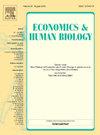青少年抑郁和注意缺陷/多动障碍对成年后受教育程度的影响
IF 1.8
3区 医学
Q2 ECONOMICS
引用次数: 0
摘要
早发性精神障碍,特别是抑郁症和注意力缺陷/多动障碍(ADHD),在美国青少年中日益受到关注。先前的研究对这些状况如何影响受教育程度提供了不确定的结果,其途径仍不清楚。本文利用国家青少年到成人健康纵向研究(Add Health)的数据估计青少年抑郁和ADHD对成人教育成就的因果影响。为了解决不可观察的混杂因素、测量误差和反向因果关系,我们采用多基因评分(pgs)和朋友自杀企图作为工具。我们发现,ADHD分数每增加一个标准差,受教育年数就会减少1.3年,获得学士学位的预测概率会减少24.6个百分点。抑郁症对受教育程度没有显著影响。我们进一步确定ADHD对教育结果的负面影响主要归因于学业成绩下降和自我调节能力受损。以学校为基础的干预措施和家长管理培训是减轻这些影响的潜在解决办法。本文章由计算机程序翻译,如有差异,请以英文原文为准。
The effects of adolescent depression and attention-deficit/hyperactivity disorder on educational attainment in adulthood
Early-onset mental disorders, particularly depression and attention-deficit/hyperactivity disorder (ADHD), are a growing concern among U.S. adolescents. Previous research offers inconclusive findings on how these conditions affect educational attainment, and the pathways remain unclear. This paper estimates the causal effects of adolescent depression and ADHD on adult educational attainment using data from the National Longitudinal Study of Adolescent to Adult Health (Add Health). To address unobservable confounders, measurement errors, and reverse causality, we employ polygenetic scores (PGSs) and friend suicide attempts as instruments. We find that a one standard deviation increase in ADHD score reduces years of education by 1.3 and the predicted probability of achieving a bachelor’s degree by 24.6 percentage points. Depression shows no significant impact on educational attainment. We further identify that the negative impact of ADHD on educational outcomes is primarily attributed to diminished academic performance and impaired self-regulation. School-based interventions and parent management training are potential solutions to mitigate these effects.
求助全文
通过发布文献求助,成功后即可免费获取论文全文。
去求助
来源期刊

Economics & Human Biology
医学-公共卫生、环境卫生与职业卫生
CiteScore
4.50
自引率
12.00%
发文量
85
审稿时长
61 days
期刊介绍:
Economics and Human Biology is devoted to the exploration of the effect of socio-economic processes on human beings as biological organisms. Research covered in this (quarterly) interdisciplinary journal is not bound by temporal or geographic limitations.
 求助内容:
求助内容: 应助结果提醒方式:
应助结果提醒方式:


